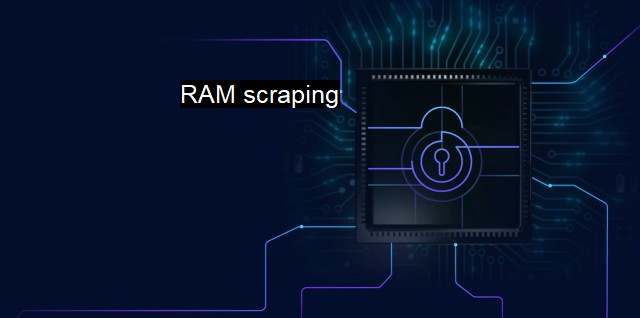What is RAM scraping?
RAM Scraping: An Elusive Cyberthreat Targeting Sensitive Data from Memory
RAM scraping, standing for random access memory scraping, is a malicious activity that occurs in the cybersecurity world. As the name suggests, it involves the scraping, or extracting, of crucial data from a device's RAM.To fully understand RAM scraping, it's essential first to comprehend the function of RAM in a system. RAM is the primary memory hardware that a computer uses to store data that it is currently processing. Any time you open a program or file, the RAM temporarily holds the necessary data. This arrangement allows your device to access information more quickly and provide you with a smooth user experience. this also means that any data actively inputted into the system, such as password keystrokes or credit card information entered, is temporarily accessible.
Cyber attackers exploit this aspect and engage in RAM scraping to steal diverse sets of sensitive data. They effectively deploy software, often referred to as malware, into the system that identifies, copies, and extracts precious data from the RAM. The types of stolen information can range from usernames and passwords to confidential credit card information or other personal data such as social security numbers.
The primary targets of RAM scraping are generally systems where sensitive data is frequently processed. These include point-of-sale systems like cash registers, educational institutions, medical institutions, and other services offering large sets of sensitive data. By installing malware into these systems, cyber attackers can quickly amass substantial amounts of precious information.
A notorious example of RAM scraping is the massive data breach that occurred with Target Corporation in 2013 when hackers stole the credit card data of nearly 40 million customers. The hacking tool the attackers used was malware, particularly crafted for RAM scraping. It extracted credit card information each time a customer swiped a card in payment terminals, thus gaining access to enormous amounts of sensitive data from the target's RAM.
Now that we understand what RAM scraping is, it's crucial to discuss how to protect against these malicious cyber attacks. On a basic yet crucial level, it begins with good cybersecurity hygiene habits. Regularly updating your antivirus and antimalware software can bolster your system's resilience against these threats since antivirus software companies continuously work to identify the latest threats and update their databases.
Since the sensitive data must pass through the RAM before it is encrypted, implementing end-to-end encryption reduces the vulnerability of critical data. By encrypting information at the point of input, it ensures data arrives in an encrypted form in the hardware and remains invulnerable to RAM scrapers.
Security professionals could also establish specific patterns of actions or sequences that would indicate potential issues. Once identified, they can then swiftly counteract them. periodically conducting system audits helps detect any unusual activities. Investing in intrusion detection systems and practicing real-time network monitoring adds another substantial layer of defense against these attacks.
RAM scraping represents a significant cybersecurity threat. While technological advancements provide numerous benefits, they also lead to sophisticated cyber attacks. RAM scraping attacks, to this end, represents one such advanced threat that targets systems' inherent vulnerabilities. Yet, with comprehensive prevention methods combining good cybersecurity habits, high-quality antivirus software, encryption technology, real-time network monitoring, and intrusion detection systems, individuals and companies can deepen their defenses against these types of cyber threats.

RAM scraping FAQs
What is RAM scraping?
RAM scraping is a cyber attack technique where attackers steal sensitive data from a computer's random access memory (RAM) by actively monitoring and intercepting data as it passes through the system.What kind of data can be stolen through RAM scraping?
RAM scraping attacks can result in the theft of sensitive information, including credit card numbers, passwords, and other confidential data stored in the computer's RAM.How do antivirus programs protect against RAM scraping?
Antivirus programs protect against RAM scraping by actively scanning for malware and suspicious activities in the system's memory. Some antivirus software also incorporate specialized detection techniques like memory scanning and behavioral analysis to detect and prevent RAM scraping attacks.What should I do if I suspect that my computer has been targeted by a RAM scraping attack?
If you suspect that your computer has been targeted by a RAM scraping attack, you should immediately disconnect from the internet and run a full system scan with your antivirus software. If you have reason to believe that your sensitive data has been compromised, you should contact your bank or other affected institutions and report the incident to the appropriate law enforcement agency.| | A | | | B | | | C | | | D | | | E | | | F | | | G | | | H | | | I | | | J | | | K | | | L | | | M | |
| | N | | | O | | | P | | | Q | | | R | | | S | | | T | | | U | | | V | | | W | | | X | | | Y | | | Z | |
| | 1 | | | 2 | | | 3 | | | 4 | | | 7 | | | 8 | | |||||||